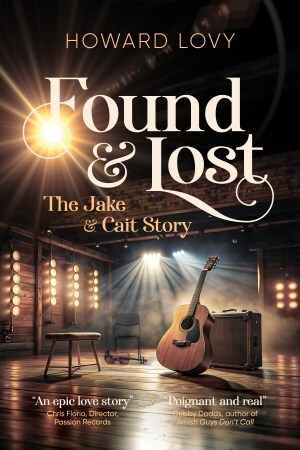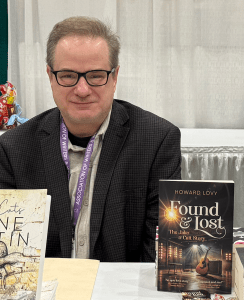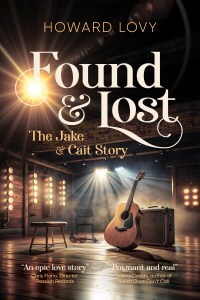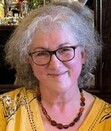In Conversation with Author Howard Lovy
 I’ve known Howard Lovy, American journalist, podcaster, and editor for eons, through our work for the Alliance of Independent Authors. I was surprised and delighted for him when he told me he was also about to become a published author. His debut novel, Found and Lost: Jake and Cait’s Story, was published by Vine Leaves Press, run by another longstanding author friend of mine, Jessica Bell. As Howard’s novel focuses around the music industry, and the multi-talented Jessica is also a singer/songwriter, I knew the story would be good.
I’ve known Howard Lovy, American journalist, podcaster, and editor for eons, through our work for the Alliance of Independent Authors. I was surprised and delighted for him when he told me he was also about to become a published author. His debut novel, Found and Lost: Jake and Cait’s Story, was published by Vine Leaves Press, run by another longstanding author friend of mine, Jessica Bell. As Howard’s novel focuses around the music industry, and the multi-talented Jessica is also a singer/songwriter, I knew the story would be good.
Sure enough, when I received an advance review copy, I was gripped – and as soon as I’d finished it, I invited Howard to be this month’s guest on my blog, to tell us the story behind the story.
Debbie: You came to novel writing relatively recently, via a long path of all kinds of writing. Please briefly describe your journey to becoming a published author.
Howard: Okay. Let’s see if I can do this briefly, because it’s been a forty-year journey.
I spent the first half of my career as a journalist, beginning with small weekly papers, then big-city dailies and then international wire services and magazines. I covered everything from politics and business to science and religion.
Then, the news industry changed and I needed to adapt in order to make a living. I’m proud to say that I launched a pioneering blog covering nanotechnology in the early 2000s that was read by Congress and the White House!
That led to gigs writing about business and technology for Wired magazine among other publications. I got into the publishing world when I became executive editor of Foreword Reviews, which covered and reviewed books from independent and university presses, along with self-published authors.
After that, I was hooked on indie publishing and launched my own editing business in addition to podcast production and hosting for the Alliance of Independent Authors.
A throughline through all this has been my interest in Jewish issues, which I’ve covered for Publishers Weekly, the Jewish Telegraphic Agency, the Jerusalem Post, and many other publications. I’m also nonfiction editor for a Jewish literary publication called Judith Magazine.
Debbie: And then you wrote a novel about music! It’s notoriously tricky to write novels about music because of copyright issues, so presumably you had to write the song lyrics that appear in the novel. Are you also a songwriter and/or musician, or was this a new experience for you?
Howard: Other than the clarinet in middle school, I’m not a musician. However, I am knowledgeable about music, all kinds of music, and know how to appreciate great musicians. And I ran this by real musicians, who told me that I really captured what it feels like to play for an audience.
As an editor, I advise clients not to include song lyrics in their books, so I knew that if I were to include them, I’d have to write them myself. This was a new experience for me, but I found that writing lyrics was simply an extension of storytelling.
I don’t know if I could write lyrics “as me,” but I could imagine the lyrics that the teenage versions of my protagonists, Jake and Cait, would write.
How would Cait write a song from her Christian religious point of view? How would Jake contribute lyrics in his character as a secular Jew who is more cynical, and how could those words meld into songs that go viral forty years later? What I came up with seemed to be successful. A couple of reviewers said they could almost hear the music as they read the book and they wished Jake and Cait were real.
Debbie: Praise indeed! Howard, you are well known as a writer on Jewish matters, but you chose to write about an interfaith relationship in your novel, and you did so in a very even-handed way. What were the challenges, risks and rewards of tackling this sensitive area?
Howard: When I wrote this novel, I was taking a quick break from writing about antisemitism and other Jewish issues. I was a little burned out. So, I decided to get out of my comfort zone and write this piece of fiction. This was before October 7, 2023, when the world changed for many Jews, including me, and frankly I don’t know if I could have written this kind of optimistic book in the last year-and-a-half.
I’m very glad that reviewers are calling it even-handed when it comes to faith. I’ve always been a student of religion—all major religions—not necessarily out of belief, but because I think it’s important to learn what motivates people. I try not to fall into the trap of caricature.
Religion is a powerful motivator for people, and it is for my protagonists, Jake and Cait.
There are many reasons I chose an interfaith couple, and there are risks in doing this, but I thought it was important to the story I was telling. They’re opposites—Jake is Jewish and rough around the edges; Cait is a classically trained Christian violinist searching for a simpler kind of faith. But when they play music together, it’s magic. They finish each other’s musical sentences. The way they make music together overrides everything else.
That idea of opposites finding connection—of working through regret, misunderstanding, and difference to make something beautiful together—feels especially meaningful right now. There is a Yiddish expression for this. It’s called beshert, or destiny. It’s usually used interchangeably with the English word “soulmate.”
But my book asks the question, what if your beshert is not exactly what you expected?
Debbie: You follow an interesting route with the timeline in the novel, not only combining flashbacks and present day, but continuing some years beyond the publication date. That took me by surprise! I admire your boldness there. Why did you choose such a far-reaching timeline rather than stopping at the present day, and what were the challenges of projecting that far ahead?
Howard: Among the themes in my book is a look at the culture of fame and also the morphing shape of memory. I’ve always been fascinated by books and stories that look at what happens to people over time. In the documentary about their lives, Jake and Cait look at their experiences through the lens of forty years.
We are all unreliable narrators of our own stories. Sometimes, we remember only the bad or only the good and choose to forget the memories that contradict the story we’ve told ourselves. In the “flash-forward” scenes toward the end of the book, I imagined this unreliable memory on a societal scale as it applies to the musical phenomenon of Jake and Cait. People remember them through the lenses of their own political, religious, or societal points of view.
Plus, “Time” is practically a character in this novel, so I thought I’d give it a little more room to develop.
Debbie: The novel is set in Michigan. To what extent is it a hymn to your homestate?
Howard: Well, they say to write what you know, and I know Northern Michigan very well.
I’m hoping the setting is a character in itself—both Interlochen, Michigan, in the present day and as the way I present it in memory.
Many people visit Northern Michigan on vacation and have childhood memories of it. To me, my memories of Interlochen Arts Camp took on this kind of mythic quality. It’s strange, just going to the camp now to promote the book. There is a mixture of things I remember from 40 years ago, and things that exist today. So, I walk through it all in a haze of reality and memory. And that’s what I wanted to show for the characters, too: There’s what they knew in 1985, and the reality of 2025 along with all the baggage that goes with it.
I also set part of the book in New York City, though, where I’ve also lived.
Debbie: The book is flying high in the Jewish fiction charts, but what other genres does it fall into?
Howard: Yes, I was very pleasantly surprised that it reached, at one time, the top three in Jewish American Fiction, even though Judaism is just one of many themes in the book. It helped that the Jewish Book Council ran a favorable review. Amazon also has it listed under “Literary Sagas,” and “Contemporary Literary Fiction“. Frankly, I just think of it as a good book.
Debbie: What does the interfaith element add to the story, and why would the book be less effective if faith didn’t come into it?
Howard: My original vision for the book had age more as a factor than faith—both their youth and their middle age—but as I developed the backstories for these characters, I found the faith angle to be more compelling.
Jake’s Judaism and Cait’s Christianity are not just aspects that stand alone as part of their characters, but they are wholly ingrained in who they are.
Their relationship with music, with the world, and with one another would not be the same without the dynamic of faith and how they can both clash and harmonize. It wouldn’t be the same book without that element.
Debbie: Late-in-life renewals of old romances are popular in fiction. How does your book go beyond the norms for this sub-genre of romance?
Howard: When I wrote the book, I had no idea that some would consider it a romance novel. In fact, it could be a subgenre called “second-chance romance.” I’m completely ignorant of all the tropes involved, though, so any regular romance readers might be disappointed—or maybe even angered—that I broke some of the rules. To say more would be a spoiler!
Debbie: This is your first novel. What’s next for you in your fiction writing life?
I found fiction to be very freeing. I could say more about “reality” through made-up characters than I could in my nonfiction work. I don’t think I’m quite done with what I’ll call the “Jake and Cait Universe.” I picture two more books in the series, the first one imagining what happened during that 40-year gap. It’s not a prequel or a sequel. I’ll call it a “middle-quel“.
Debbie: How interesting – I don’t think I’ve come across a middle-quel before! Now, if readers like (insert other author name here), they’ll love Howard Lovy.” Please fill in the blank!
Howard: Taylor Jenkins Reid, Ann Patchett, and Jennifer Egan
Debbie: Your publisher is Vine Leaves Press, a thriving small indie publisher, Why are you especially pleased that they picked up your book?
Howard: I have nothing but wonderful things to say about Vine Leaves Press! They’ve been incredibly communicative and supportive throughout the editing and publishing process. I’ve enjoyed working with them—especially publisher Jessica Bell’s amazing cover design.
Debbie: Finally, Howard, could you please provide a brief extract to give readers a flavour of your novel.
As it turned out, they would record “Love Moves On” a few months later in a place far away from the tall grass, hemlock, and pine of Northern Michigan. Then the song would sleep for forty years before awakening into the ears of millions in a nuclear explosion that would change their lives forever and wreak untold collateral damage.
And that was only their first song.
ALL ABOUT HOWARD LOVY Howard Lovy is a veteran journalist, book editor, and author with 40 years of experience covering topics ranging from science and technology to Jewish issues. His work has appeared in Publishers Weekly, Longreads, The Jerusalem Post, and many more. A former executive editor of Foreword Reviews, he also hosts a podcast for the Alliance of Independent Authors. Howard lives in Northern Michigan with his wife, Heidi, and their dog, Henry. You can find him at https://howardlovy.com/
Howard Lovy is a veteran journalist, book editor, and author with 40 years of experience covering topics ranging from science and technology to Jewish issues. His work has appeared in Publishers Weekly, Longreads, The Jerusalem Post, and many more. A former executive editor of Foreword Reviews, he also hosts a podcast for the Alliance of Independent Authors. Howard lives in Northern Michigan with his wife, Heidi, and their dog, Henry. You can find him at https://howardlovy.com/
 I was pleased to receive an advance copy of Howard Lovy’s debut novel, having enjoyed his podcasts and journalism, but I wasn’t sure what to expect – and this gentle, slow-burn romance surprised me in the best possible way.
I was pleased to receive an advance copy of Howard Lovy’s debut novel, having enjoyed his podcasts and journalism, but I wasn’t sure what to expect – and this gentle, slow-burn romance surprised me in the best possible way.
It’s a gentle, sensitive tale of youthful love forged by a shared musical talent, which ends in a sudden break-up unexplained until the end. Forty years later the revival of the couple’s music as a viral internet sensation – written long before viral social media posts were a thing – brings them back together in a storm of supportive publicity.
Although bound by an almost telepathic ability to play so well together, the young couple face other challenges brought about by their differences. She is a sincere Christian investigating different kinds of belief and he a Jew; she is a classically-trained, highly-educated musician, he is self-taught.
The unusual structure of the story is not only divided by two timelines decades apart, but also by the interspersal of transcripts of a TV documentary delving into their past as they reunite after 40 years apart. The insights into the music industry, past and present, and the occasional appearance of real-life musicians and producers such as the great Suzanne Vega add further depth and interest to this rewarding novel.
Highly recommended to anyone who enjoys clean romance reuniting past lovers, or who likes intelligent and original feel-good fiction.
HOW TO ORDER HOWARD’S NOVELFound & Lost: The Jake & Cait Story can be purchased through Vine Leaves Press here or on Amazon here.



